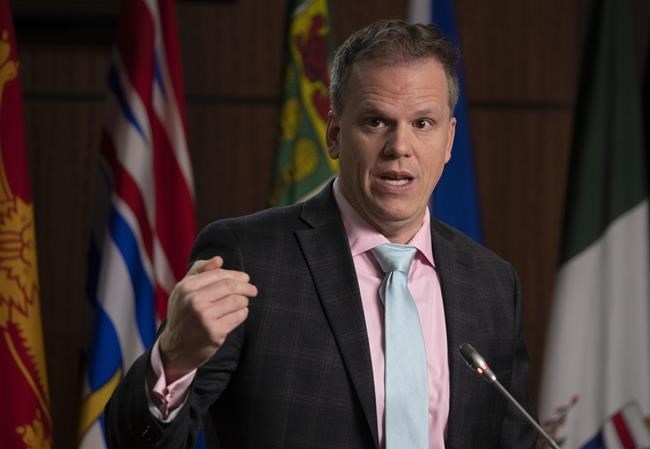OTTAWA — Government House leader Mark Holland is questioning the relatively high number of medical exemptions among the Conservative ranks preventing them from being vaccinated against COVID-19.
On Monday, The Canadian Press reported that four Conservative MPs have not set foot in the House of Commons for more than a week, since the adoption of a motion to cross-check medical exemptions so they are compatible with those of Ontario public health.
Ontario Conservative MPs Dean Allison and Colin Carrie had previously said publicly that they were not vaccinated because they had a medical exemption that prevents them getting the shot.
Saskatchewan Conservative MP Cathay Wagantall hinted on Monday that her medical exemption was still under consideration by the House of Commons.
Ted Falk, a Conservative MP from Manitoba, has refused to discuss his vaccination status and has also been absent for several days.
Holland told reporters on Tuesday that it's very unlikely, if not impossible, that four elected Conservatives out of 119 benefit from a legitimate medical exemption.
He called on the Conservatives to be transparent about the real number of unvaccinated elected officials.
"I said from the beginning that I believe there were more than one," Holland said. "It certainly appears that is the case, and it stretches all credibility to believe that those are legitimate medical exemptions."
But Holland would not go further, adding: "I deliberately am not going to entertain whether or not a member is or is not honest."
Ontario's chief medical officer of health Dr. Kieran Moore estimates that provincially recognized medical exemptions — either severe allergy to a vaccine component or myocarditis — affects between one and five in 100,000 people.
"This doesn't add up, and it doesn't send a good message to the country," Holland said of the Conservative numbers. "We all have to get vaccinated; we (have) got to get this pandemic over."
The Liberals and New Democrats voted on Nov. 26 in favour of a motion to bring back the hybrid Parliament. All elected officials who decide to participate in person must be vaccinated and those who are not must have a medical exemption recognized by the Ontario public health.
The Bloc Québécois voted against the motion, but agreed with compulsory vaccination for all elected officials who wish to participate in the proceedings in person.
On Monday, Wagantall challenged the wording of the Nov. 26 motion, which she said goes too far.
The Saskatchewan MP argued the motion "sets a dangerous precedent."
"It allows political interference in what should be objective decision-making by the health professionals who serve us parliamentarians," she said.
On Tuesday, Speaker Anthony Rota delivered his ruling on the points raised by Wagantall, noting the House has the authority to make decisions on access to the chamber.
"Given the clear decision of the House, I cannot find that the member's privilege has been breached … In the view of the chair, the matter has been decided by the House and accordingly, I find that there is no prima facie question of privilege," Rota ruled.
Conservative Leader Erin O'Toole has not confirmed the number of medical exemptions among its ranks.
However, he assured reporters that his MPs would abide by the rules of the House of Commons.
This report by The Canadian Press was first published Dec. 7, 2021.
Catherine Lévesque, The Canadian Press


